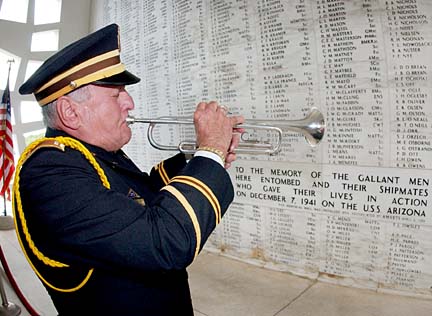
ASSOCIATED PRESS
Dale Sprosty, who has played taps since 1948 and full-time for the last 10 years, estimates that he's played taps more than 5,000 times. Sprosty's performance at the USS Arizona Memorial last month fulfilled his longtime dream to pay tribute to those killed at Pearl Harbor.
Bugler’s tribute resounds
Dale Sprosty fulfills his
longtime dream of playing
taps at Pearl Harbor
For years, Dale Sprosty dreamed of paying tribute to those killed at Pearl Harbor the only way he knew how.
The 72-year-old Mount Pleasant, Mich., man stood stoically at the USS Arizona Memorial one day last month, lifted his silver Selmer trumpet to his lips, and spurted the mournful 24 notes called taps.
When he was done, Sprosty lowered his instrument, walked away, and cried.
Sprosty has been playing taps since 1948, and full-time for the last 10 years. In all, he says he's played taps more than 5,000 times.
"This is all I do," Sprosty said. "It's not an obsession. I guess 'duty' would be a better word."
Sprosty first played taps as a member of the 1st Army Headquarters Band in New York. He served in that unit for four years, until 1952, playing for Presidents Eisenhower and Truman, at parades down Broadway and, most often, at reburials of World War II soldiers.
After leaving the service, Sprosty joined the family bag business (potato bags, money bags and so forth), though he continued to play at veterans' funerals, usually two or three times a month.
When Sprosty retired in 1993, he found himself looking for something meaningful to fill his time. He decided to make taps his full-time job.
He phoned every Michigan funeral director and all the local service clubs and let them know he was available to play taps at veterans' funerals. The calls trickled in.
Sprosty's devotion to his cause -- during a shortage of musicians for military funerals -- caught the eye of The Washington Post and the Associated Press, who covered his performance at Arlington National Cemetery in October 1996. After the articles appeared, requests came from all over for him to play not only at burials, but baseball games, parades, flag-raisings and all matter of other civic affairs.
But for years, he has wanted to make his first trip to Hawaii, to honor the 2,390 people killed in the Dec. 7, 1941, attack on Pearl Harbor.
The gold buttons on his Army dress blues grabbing the midday sun, Sprosty showed a nervous enthusiasm as he watched the Arizona memorial draw closer from the boat he sat on.
When he reached his performance spot, he breathed in deeply before beginning the song. He kept his eyes closed. His chin quivered. His face turned red. Sweat rolled from his sideburn.
The song hung briefly in the muggy August air, tinged with the scent of the oil seeping from the ship below. And in 50 seconds, it was done.
"It just does the same thing to you every time," said Delia Garcia, 57, a restaurant owner in Monterey, Calif., who wiped tears from her eyes as Sprosty played. "It's just something reverent, something so mystical. It definitely comes from the soul."
For all the times Sprosty plays the sorrowful tune, it is not something he takes pleasure in.
"I don't enjoy playing taps," he said. "I do it as something that needs to be done and needs to be done correctly. It doesn't give me pleasure. It doesn't make me smile. It's strictly an honor thing."
About 1,600 veterans die each day in the United States. On average, 10 percent to 15 percent have military funeral honors, though there still aren't enough military buglers and trumpeters to go around. Recorded music is often used as a substitute.
Sprosty had just one free day in Hawaii before going back to Michigan for another funeral. He traveled here alone.
"People ask, 'You're going on vacation to Hawaii?'" he said. "I say, 'You go to Hawaii for vacation. I'm going to Pearl Harbor.'"
